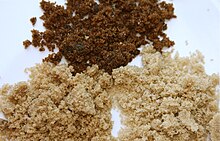**History and Origin**:
– Muscovado sugar originated in India around 1000 BCE.
– Traded in the Triangular Trade route and played a role in the colonial sugar industry in Indonesia.
– Associated with the early Islamic world’s agricultural innovations.
– Mentioned in historical texts like ‘The Economic Products of India.’
– Spread globally through Austronesian, Muslim, Arab, and European traders.
**Production and Industry Impact**:
– Muscovado sugar is a type of unrefined sugar made from sugar cane juice.
– Three main production methods: manual, industrial centrifuge, modern industrial.
– Massecuite used in jaggery production.
– Global production around 10-11 million tons annually by 20 nations.
– India is the largest producer, followed by Colombia, Myanmar, Pakistan, Brazil, Bangladesh, and China.
**Nutritional Value and Health Benefits**:
– Muscovado sugar is richer in minerals like phosphorus, calcium, magnesium, potassium, and iron.
– Contains 383 kCal per 100g.
– Retains natural minerals from sugar cane juice.
– Nutritionally beneficial when produced under regulated conditions.
– Used in Ayurvedic medicine for blood purification, digestion, bone health, and lung health.
**Culinary and Traditional Uses**:
– Muscovado sugar is used in masala tea, Indian filter coffee, and traditional Indian sweets.
– Dark brown, coarser, and stickier than brown sugar.
– Good resistance to high temperatures and long shelf life.
– Adds depth to baked goods, desserts, caramel, toffee, beverages, savory dishes, marinades, and sauces.
– Can be substituted for brown sugar in recipes by adjusting liquid content.
**Global Recognition and Consumption**:
– Muscovado sugar is recognized internationally for its quality and unique taste.
– Increasing popularity due to its distinctive flavor and unrefined qualities.
– Exported to various countries for culinary purposes.
– Used in the food industry for its complex flavor profile.
– Consumers appreciate its natural and unrefined qualities.
Muscovado is a type of partially refined to unrefined sugar with a strong molasses content and flavour, and dark brown in colour. It is technically considered either a non-centrifugal cane sugar or a centrifuged, partially refined sugar according to the process used by the manufacturer. Muscovado contains higher levels of various minerals than processed white sugar, and is considered by some to be healthier. Its main uses are in food and confectionery, and the manufacture of rum and other forms of alcohol. The largest producer and consumer of muscovado is India.

